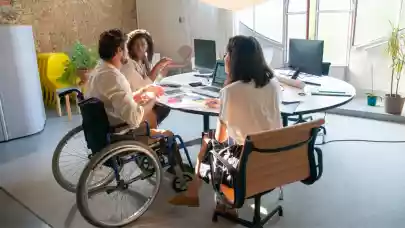
The WELL Building Standard officially accepts the Access4you Certification as an alternative compliance option for Feature C13, which focuses on accessibility and universal design. This integration helps WELL projects gain a new, global compliance opportunity and creates a supportive environment for people with diverse accessibility needs.
Accessibility is a right for everyone
According to the World Health Organization (WHO), an estimated 1.3 billion people, or about 16% of the global population, have a significant disability. People with disabilities face challenges such as those relating to accessibility in buildings and transportation, and “have twice the risk of developing conditions such as depression, asthma, diabetes, stroke, obesity or poor oral health.” Wayfinding, or knowing how to follow a navigational route, is fundamental for autonomy, social integration, and community access for all individuals. Reliable accessibility information can aid individuals in navigating new places confidently and also benefits others, such as parents with baby strollers, the elderly, those with temporary impairments, and even people with heavy luggage.
Together for a more inclusive real estate market
Access4you has been included as a published Alternative Adherence Path (AAP) under the WELL Building Standard (WELL v2) accessibility feature. The WELL Building Standard is the world’s premier building rating system that provides actionable strategies for health and well-being at the building, organisational, and community levels. The compliance alternative is an official approval and technical guidance process that allows a project to apply an alternative strategy to meet a specific point within the standard.
Access4you is a data-driven system that audits, certifies, and qualifies the accessibility of the built environment in 16 real estate segments for 8+1 groups with accessibility needs: Wheelchair users; the Elderly and people with limited mobility; the Blind; visually impaired people, the Deaf, the hard of hearing; people with cognitive impairments; people pushing prams; and people with service dogs. The company provides the on-site collected, detailed, and reliable data to the building owners, its investors, its tenants, and end-users living with disabilities, as well as a detailed development proposal to become more accessible. Properties can achieve a Certified, Bronze, Silver, or Gold Certification based on the level of inclusion. It supports companies in developing their level of inclusion and accessibility and achieving their business and ESG goals through certified social sustainability data. It has now assessed 1000 buildings in 23 countries and operates in the CEE, SEE, and India with the help of an accredited partner network.

Real estate segments such as shopping centres and office buildings achieving Access4you Bronze Certification can earn 2 points under the WELL Building Standard’s Community concept, Feature C13, which focuses on accessibility and universal design. It requires projects to integrate the principles of universal design and wayfinding to create an inclusive environment that meets various needs and create a more inclusive environment.
“IWBI and Access4you are working together to create a more accessible and, therefore, a more inclusive, human-centric world,” said Balázs Berecz, Founder and CEO of Access4you, who has been a wheelchair user since 2005. “By providing accessibility information to people with disabilities, Access4you enables WELL to directly contribute to the inclusion of people with accessibility needs.
“We’re pleased to recognise Access4you Bronze Certification as an equivalency within the WELL Standard,” said Ann Marie Aguilar, Senior Vice President, EMEA, International WELL Building Institute. “WELL v2’s evidence-based and technically robust interventions were developed based on global principles that celebrate people for who they are and provide the tools they need to thrive. Access4you contributes meaningfully to WELL by benefitting a variety of people, thereby expanding accessibility and advancing well-being for everyone.”



